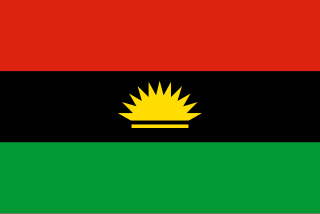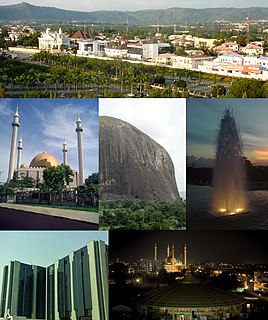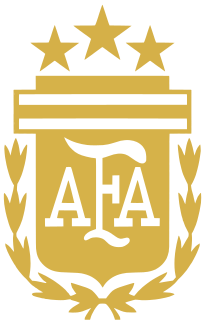
Nigeria, officially the Federal Republic of Nigeria, is a country in West Africa. It is situated between the Sahel to the north and the Gulf of Guinea to the south in the Atlantic Ocean. It covers an area of 923,769 square kilometres (356,669 sq mi), and with a population of over 225 million, it is the most populous country in Africa, and the world's sixth-most populous country. Nigeria borders Niger in the north, Chad in the northeast, Cameroon in the east, and Benin in the west. Nigeria is a federal republic comprising 36 states and the Federal Capital Territory, where the capital, Abuja, is located. The largest city in Nigeria is Lagos, one of the largest metropolitan areas in the world and the second-largest in Africa.

The Federal government of Nigeria is composed of three distinct branches: legislative, executive, and judicial, whose powers are vested by the constitution of Nigeria in the National Assembly, the President, and the federal courts, including the Supreme Court, respectively. The constitution provides a separation and balance of powers among the three branches and aims to prevent the repetition of past mistakes made by the government.

Biafra, officially the Republic of Biafra, was a partially recognised secessionist state in West Africa that declared independence from Nigeria and existed from 1967 until 1970. Its territory consisted of the predominantly Igbo-populated then Eastern Region of Nigeria which is now divided into the South-East and South-South regions of Nigeria. Biafra was established on 30 May 1967 by Igbo military officer C. Odumegwu Ojukwu under his leadership as the governor of the then Eastern region of Nigeria, following a series of ethnic tensions and military coups after Nigerian independence in 1960 that culminated in the 1966 massacres of Igbo people and other Eastern ethnic groups living in northern Nigeria. The military of Nigeria proceeded to invade Biafra shortly after its secession, resulting in the start of the Nigerian Civil War.

Abuja is the capital and eighth most populous city of Nigeria. Situated at the centre of the country within the Federal Capital Territory (FCT), it is a planned city built mainly in the 1980s based on a master plan by International Planning Associates (IPA), a consortium of three American planning and architecture firms made up of Wallace, Roberts, McHarg & Todd as the lead, Archisystems International, and Planning Research Corporation. The Central Business District of Abuja was designed by Japanese architect Kenzo Tange. It replaced Lagos, the country's most populous city, as the capital on 12 December 1991.

Lagos is the largest city in Nigeria and the second most populous city in Africa, with a population of 15.4 million as of 2015 within the city proper. Lagos was the national capital of Nigeria until December 1991 following the government's decision to move their capital to Abuja in the centre of the country. The Lagos metropolitan area has a total population of roughly 23.5 million as of 2018, making it the largest metropolitan area in Africa. Lagos is a major African financial centre and is the economic hub of Lagos State and Nigeria at large. The city has been described as the cultural, financial, and entertainment capital of Africa, and is a significant influence on commerce, entertainment, technology, education, politics, tourism, art, and fashion. Lagos is also among the top ten of the world's fastest-growing cities and urban areas. The megacity has the fourth-highest GDP in Africa and houses one of the largest and busiest seaports on the continent. The Lagos metropolitan area is a major educational and cultural centre in Sub Saharan Africa.
The naira is the currency of Nigeria. One naira is divided into 100 kobo.

Nigeria is a federation of 36 states and 1 federal capital territory. Each of the 36 states is a semi-autonomous political unit that shares powers with the federal government as enumerated under the Constitution of the Federal Republic of Nigeria. The Federal Capital Territory (FCT), is the capital territory of Nigeria, and it is in this territory that the capital city of Abuja is located. The FCT is not a state but is administered by elected officials who are supervised by the federal government. Each state is subdivided into local government areas (LGAs). There are 774 local governments in Nigeria. Under the constitution, the 36 states are co-equal but not supreme because sovereignty resides with the federal government. The constitution can be amended by the National Assembly, but each amendment must be ratified by two-thirds of the 36 states of the federation.

The Africa Cup of Nations referred to as AFCON, and sometimes as African Cup of Nations, is the main international men's association football competition in Africa. It is sanctioned by the Confederation of African Football (CAF), and was first held in 1957. Since 1968, it has been held every two years, switching to odd-numbered years in 2013.

The Peoples Democratic Party is one of the two major contemporary political parties in Nigeria, along with its main rival, the All Progressives Congress.

The Argentina national football team represents Argentina in men's international football and is administered by the Argentine Football Association, the governing body for football in Argentina.

The president of the Federal Republic of Nigeria is the head of state and head of government of the Federal Republic of Nigeria. The president directs the executive branch of the federal government and is the commander-in-chief of the Nigerian Armed Forces.

Muhammadu Buharipronunciation is a Nigerian politician, who has served as the president of Nigeria since 2015.

Lagos State is a state in southwestern Nigeria. Of the 36 states, it is both the most populous and smallest in area. Bounded to the south by the Bight of Benin and to the west by the international border with Benin Republic, Lagos State borders Ogun State to the east and north making it the only Nigerian state to border only one other state. Named for the city of Lagos—the most populous city in Africa—the state was formed from the Western Region and the former Federal Capital Territory on 27 May 1967.

The Nigerian Civil War, also known as the Nigerian–Biafran War or the Biafran War, was a civil war fought between Nigeria and the Republic of Biafra, a secessionist state which had declared its independence from Nigeria in 1967. Nigeria was led by General Yakubu Gowon, while Biafra was led by Lieutenant Colonel Chukwuemeka "Emeka" Odumegwu Ojukwu. Biafra represented the nationalist aspirations of the Igbo ethnic group, whose leadership felt they could no longer coexist with the federal government dominated by the interests of the Muslim Hausa-Fulanis of Northern Nigeria. The conflict resulted from political, economic, ethnic, cultural and religious tensions which preceded the United Kingdom's formal decolonization of Nigeria from 1960 to 1963. Immediate causes of the war in 1966 included a military coup, a counter-coup, and anti-Igbo pogroms in Northern Nigeria. Control over the lucrative oil production in the Niger Delta also played a vital strategic role.

The Nigeria national football team represents Nigeria in men's international football. Governed by the Nigeria Football Federation (NFF), they are three-time Africa Cup of Nations winners, with their most recent title in 2013. In April 1994, the Nigerian national football team was ranked 5th in the FIFA rankings, the highest FIFA ranking position ever achieved by an African football team. Throughout history, the team has qualified for six of the last eight FIFA World Cups, missing only the 2006 edition and 2022 edition. They have reached the round of 16 on three occasions. Their first World Cup appearance was the 1994 edition. The team represents FIFA and Confederation of African Football (CAF).

The Nigeria Football Federation is Nigeria's football governing body. It was formally launched in 1945 and formed the first Nigerian national football team in 1949. It joined CAF in 1959 and FIFA in 1960. The NFF headquarters is located in the city of Abuja.
Awo-Idemili is the headquarters of Orsu Local Government, Imo State in southeastern Nigeria. It is located near the city of Orlu.

Nigerians or the Nigerian people are citizens of Nigeria or people with ancestry from Nigeria. Nigeria is composed of various ethnic groups and cultures and the term Nigerian refers to a citizenship-based civic nationality. Nigerians derive from over 250 ethnic groups and languages. Though there are multiple ethnic groups in Nigeria, economic factors result in significant mobility of Nigerians of multiple ethnic and religious backgrounds to reside in territories in Nigeria that are outside their ethnic or religious background, resulting in the mixing of the various ethnic and religious groups, especially in Nigeria's cities. The English language is the lingua franca of Nigerians. 50% of Nigerians are Muslims and about 49.3% are Christians. These are the two major religions, according to statista.com, more than half of the Nigerian population is said to be Muslim, others are also practiced but are not as widely known as these two.

Boko Haram, officially known as Jamā'at Ahl as-Sunnah lid-Da'wah wa'l-Jihād, is an Islamic terrorist organization based in northeastern Nigeria, which is also active in Chad, Niger, and northern Cameroon. In 2016, the group split, resulting in the emergence of a hostile faction known as the Islamic State's West Africa Province.

Damini Ebunoluwa Ogulu , known professionally as Burna Boy, is a Nigerian singer, songwriter and record producer. He rose to stardom in 2012 after releasing "Like to Party", the lead single from his debut studio album, L.I.F.E (2013). In 2017, Burna Boy signed with Bad Habit/Atlantic Records in the United States and Warner Music Group internationally. His third studio album, Outside, marked his major-label debut.















